The Battle of the P67 Boards - ASUS vs. Gigabyte at $190
by Ian Cutress on January 20, 2011 4:15 PM EST- Posted in
- Motherboards
- Gigabyte
- Asus
- P67
USB Speed
For this benchmark, we run CrystalDiskMark to determine the ideal sequential read and write speeds for the USB port using our 64GB Patriot SuperSpeed USB 3.0 drive. Then we transfer a set size of files from the SSD to the USB drive, and monitor the time taken to transfer. The files transferred are a 1.52 GB set of 2867 files across 320 folders – 95% of these files are small typical website files, and the rest (90% of the size) are the videos used in the Sorenson Squeeze test.
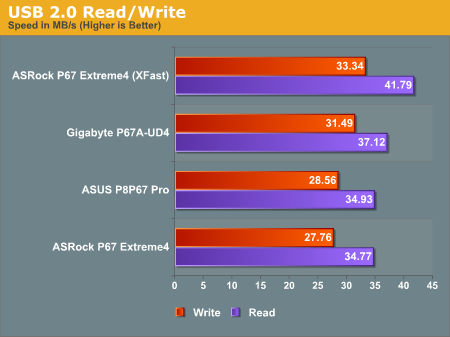
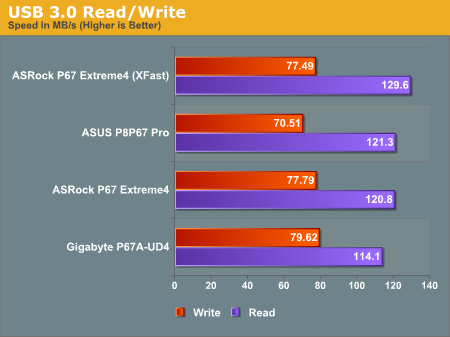
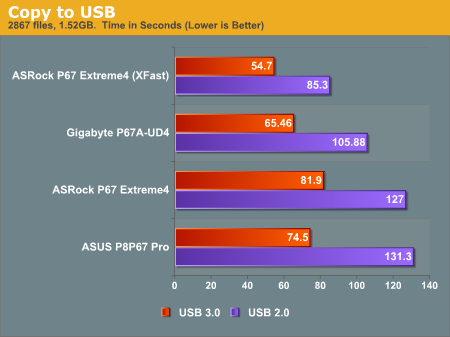
The Gigabyte board overall has the better USB performance, especially in USB 3.0 read speeds. This is accurately translated by the difference in copy time difference between the ASUS and Gigabyte boards in both USB 2.0 and USB 3.0.
3D Movement Algorithm Test
The first benchmark ran is actually one I have written. My full time job involves computational chemistry, so this first benchmark uses various algorithms for three-dimensional simulation and movement of independent particles. The algorithms both employ uniform random number generation or normal distribution random number generation, and vary in various amounts of trigonometric operations, conditional statements, generation and rejection, fused operations, etc. The benchmark runs through six algorithms for a specified number of particles and steps, and calculates the speed of each algorithm, then sums them all for a final score. This is an example of a real world situation that a computational scientist may find themselves in, rather than a pure synthetic benchmark. The benchmark is also parallel between particles simulated, and we test the single thread performance as well as the multi-threaded performance.
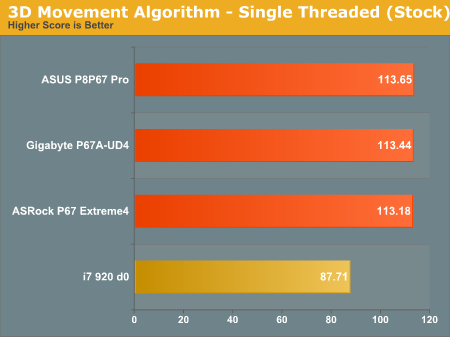
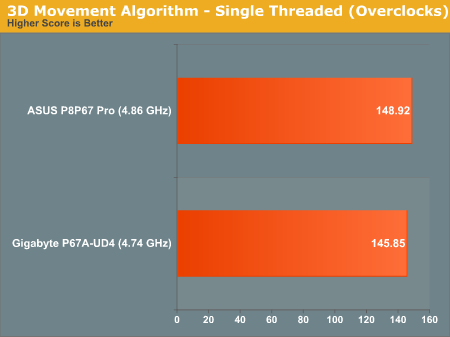
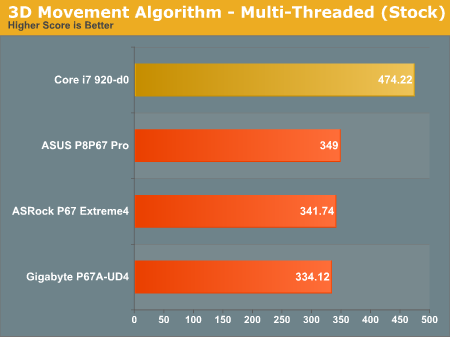
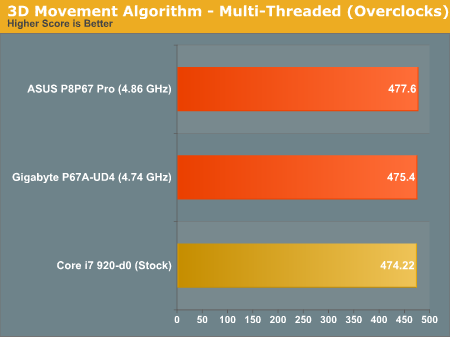
There's barely anything between the boards. The Core i7-920 pulls ahead at stock as it has 8 threads to tackle the workload, whereas the i5-2500K used in the P67 motherboards only has four.
WinRAR x64 3.93
With 64-bit WinRAR, we compress the set of files used in the USB speed tests. WinRAR x64 3.93 attempts to use multithreading when possible.
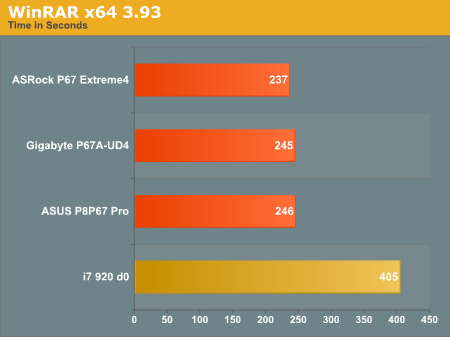
FastStone Image Viewer 4.2
FastStone Image Viewer is a free piece of software I have been using for quite a few years now. It allows quick viewing of flat images, as well as resizing, changing color depth, adding simple text or simple filters. It also has a bulk image conversion tool, which we use here. The software currently operates only in single-thread mode, which should change in later versions of the software. For this test, we convert a series of 170 files, of various resolutions, dimensions and types (of a total size of 163MB), all to the .gif format of 640x480 dimensions.
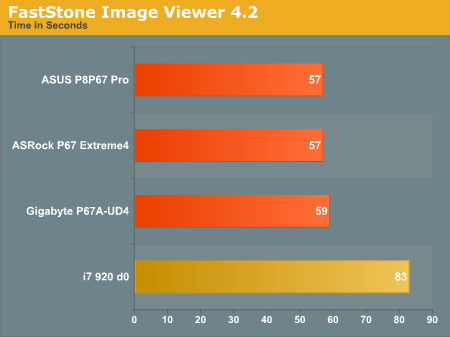
Sorenson Squeeze 6.0
Sorenson Squeeze is a professional video encoder, complete with a vast array of options. For this test, we convert 32 HD videos, each a minute long and approximately 42 MB in size, to WMV 512KBps format. Squeeze can encode multiple videos at once, one for each thread.
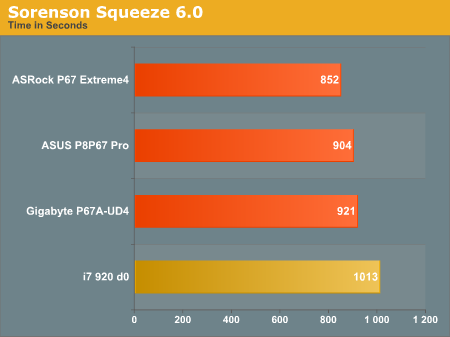
Conclusions
There is not much in it, but the ASUS board performs better in most benchmarks with one exception - the USB speed (especially the USB 3.0 read) is a step behind the Gigabyte.










137 Comments
View All Comments
erple2 - Friday, January 21, 2011 - link
Technically, there has simultaneously always and never been a "perfect storm" of price and performance. Things always get faster at the same price point over time.As a commenter above pointed out, while these machines may be able to decode stuff quickly (and I'm guessing the 2600k will be faster), when their "system price" comes down to whatever sweet spot you are targeting, we'll have additional things we want to do with our computers (3D movies, 4K HD, 8K hD etc) that will tax these beyond what we consider "reasonable" today.
Ultimately, things ALWAYS get cheaper for the same level of performance and/or do more with the same cost. That's what progress "mandates". Unfortunately, we demand more things to be done, so the perceived amount of extra work you can do never really seems to go down. I used to be happy running a 386-DX40 in the DOS days. Things seemed fast and speedy then. I acknowledge that I do more today than I did back then, though I'm not sure if that's because the software does more, rather than I do more.
My advice - pick a budget and when you can no longer reasonably do what you now do, then buy with an eye to the future. I picked a fairly high budget, but I wanted to get a 'significant' upgrade that would still be usable 3 years in the future. My Core2Duo lasted from 2007 until the end of 2010, when I (foolishly) bought an i7-950.
marc1000 - Friday, January 21, 2011 - link
and in the 067 boards we can't use the encoding abilities from Sandy Bridge, because the on-chip GPU is turned-off in this chipset. so the only value in $150 boards is x8/x8 PCIe (cheaper boards cut this to x16/x4, a stupid thing but the only way to force us to spend more).medi01 - Saturday, January 22, 2011 - link
Which "encoding abilities" are we talking about, please? Shamelessly hyped increased speed, achieved at the cost of quality loss, eh?Beenthere - Thursday, January 20, 2011 - link
Asus has a long history of delivering half-baked goods - which this review confirms has happened once again. That and the fact that Asus provides zero customer support in my and many other customer's experience, means I'll vote with my wallet and get the Gigabyte mobo. I know the Asus fanbois will ignore the product defects and buy the Asus mobo anyway because of some review which shows it will OC by 2 Hz. more or something insignificant. This is how Asus dupes the naive kids.Rick83 - Thursday, January 20, 2011 - link
Well, I'm monitoring the Gigabyte boards, and there's the same image as you'd expect from the ASUS side. Plus with the weird BIOS-flash thing happening on all the boards, and the features that are missing on the Gigabyte boards, I think I'll take an ASUS this time around. (Though any board will be a step down from my brilliant IP35 Pro.... RIP ABIT)Digital Audio Inputs seem to have died out completely....
In the end, I think I'll go with the microATX ASUS in the new Fortress FT3 by Silverstone...
SmCaudata - Thursday, January 20, 2011 - link
I want to do the same build. I'm hoping for a new GENE or equivalent ASrock board. The FT3 looks like it can handle SLI well. Would be fun to build that powerful of a system in w small package and still have awesome thermals.Gothmoth - Thursday, January 20, 2011 - link
gigabyte boards make way more trouble then asus boards.don´t remind me on the samsung drives or hitachi drives that would not work for 8 month with gigabyte boards.
take a look at gigabytes support forum and you will see how "happy" the gigabyte users are. LOL.
milkyway4me - Thursday, January 20, 2011 - link
Asus does advance RMA, gigabyte doesn't. That and that alone, is why any reasonable person should choose Asus barring some massive issue that sticks out to them.Duwelon - Thursday, January 20, 2011 - link
And i've had the exact experience with Asus and Gigabyte. Last 3 computers I built all used Gigabyte board. 1 bad video card (fanless gigabyte 4550 and they replaced it with a geforce 9600gt with a fan... gee thanks for the downgrade in performance and features and upgrade in noise, thanks so very much). 1 Gigabyte board is acting up, the NIC keeps disappearing without a trace, had to install a PCI NIC to keep it on the network. I friggin hate Gigabyte's RMA process, but they're still better than some i've had to use. Asus, never had a problem with their RMA and they were a little faster than Gigabyte from what I remember. To each their own, sadly they both have flaws and neither are much better than the other. Overall though, given my recent screwing over by Gigabyte and recent issues, my pendulem is swinging towards Asus again.seamusmc - Friday, January 21, 2011 - link
I've had boards from all major vendors, ASUS, Intel, Gigabyte, Abit, DFI, etc. They've all had duds and they've all had great boards. I currently have 4 ASUS x48 Rampage's, (Home Server, Work, Wife and Game), and it is one of my favorites among many favorites. ASUS CULV is another stand out in my memory.In my experience, ASUS hasn't delivered more half-baked goods then anyone else.
Right now, it seems to me all the boards are having issues and that's to be expected with a new chipset. This is why I decided last month, despite my unquenchable hunger to upgrade, to wait at least until Feb to upgrade. At this point I may wait until March.